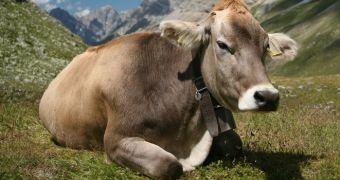An international team of scientists, led by experts with the Division of Animal Sciences at the University of Missouri (MU) in Columbia, was recently able to complete a reconstruction of the genetic history of 134 cattle breeds from around the world. During this study, the group determined that ancient African domesticated cattle originated in an area known as the Fertile Crescent.
This region covers areas of modern-day Iraq, Jordan, Israel and Syria, the team explains. By retracing the genetic heritage of all these cattle breeds, the researchers were able to confirm an older suspicion anthropologists had, that cows native to the African continent around 10,000 years ago did not evolve there, but were rather brought in from elsewhere.
The investigation was led by lead researcher Jared Decker, who holds an appointment as an assistant professor of animal science with the College of Agriculture, Food and Natural Resources at MU. Experts from the Universidad de Córdoba, the University of Nottingham, the Uppsala University, the Ankara University and the Northwest A&F University were also a part of the study, among others.
Decker argues in the new paper that numerous genetic markers found in African cattle breeds are very similar or identical to markers discovered in cattle that originated in the Middle East around 10 millennia ago. His team suspects that ancient farmers brought the animals into the Old Continent during their south-bound migrations.
One of the reasons why geneticists remained confused about the evolutionary history of African cattle until now is that the animals bred with native African aurochs upon arriving into their new habitats. This processes muddied the genetic footprint of their ancestors, and made determining their true origins more complicated.
Details of the new study were published in the March 27 issue of the open-access, peer-reviewed scientific journal PLoS Genetics, which is edited by the Public Library of Science. The paper also provides an explanation for cattle breeds in the Americas, such as the unique Texas longhorn.
Researchers were able to determine that this species traces its genetic roots to Spanish cattle brought to the new world in the 16th century, which intermingled their genes with that of Indian Brahman cattle imported into the United States from Brazil back in the late 1800s.
“In many ways, the history of cattle genetics mirrors human history. In the case of African cattle, anthropologists and geneticists used to suspect that domesticated African cattle were native to the continent, when in fact, they were brought by migrating peoples thousands of years ago,” Decker says.
“By better understanding the history of the animals we domesticate, we can better understand ourselves,” the expert concludes, quoted by Seed Daily.

 14 DAY TRIAL //
14 DAY TRIAL //